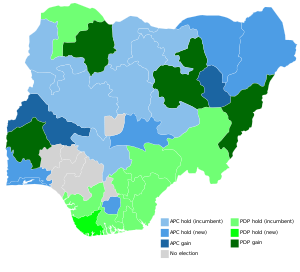| |||||||||||||||||||||||||||||||||
31 governorships | |||||||||||||||||||||||||||||||||
|---|---|---|---|---|---|---|---|---|---|---|---|---|---|---|---|---|---|---|---|---|---|---|---|---|---|---|---|---|---|---|---|---|---|
| |||||||||||||||||||||||||||||||||
 | |||||||||||||||||||||||||||||||||
The 2019 Nigerian gubernatorial elections were held for state governors in 31 out of 36 Nigerian states. All but three were held on 2 March 2019 with the election for Rivers State being postponed until 4 April,[1] while the Kogi State and Bayelsa State elections were both held on 16 November. The last regular gubernatorial elections for all states were in 2015.
All states have a two term limit for Governors which made several incumbent governors ineligible for re-election. Seven APC governors were term-limited while eleven incumbent APC governors were eligible for re-election. Among PDP governors, three were term-limited while ten could seek re-election. Elections were held in 18 of the 22 states with APC governors and all 13 of the states with PDP governors. Incumbent state governors running to be reelected included 11 APC governors and 10 PDP governors.
The PDP picked up four governorships from the APC in Adamawa, Bauchi, Oyo, and Zamfara while the APC picked up two governorships from the PDP in Gombe and Kwara; net change was PDP+2. Court decisions changed results in several states with the APC winners in Bayelsa and Zamfara being disqualified prior to their inaugurations while the PDP's win in Imo State was overturned after the erstwhile winner governed for over seven months.
- ^ Opejobi, Seun (2019-04-03). "Rivers election: PDP reacts as INEC declares Wike winner of governorship election". Daily Post Nigeria. Retrieved 2021-04-14.